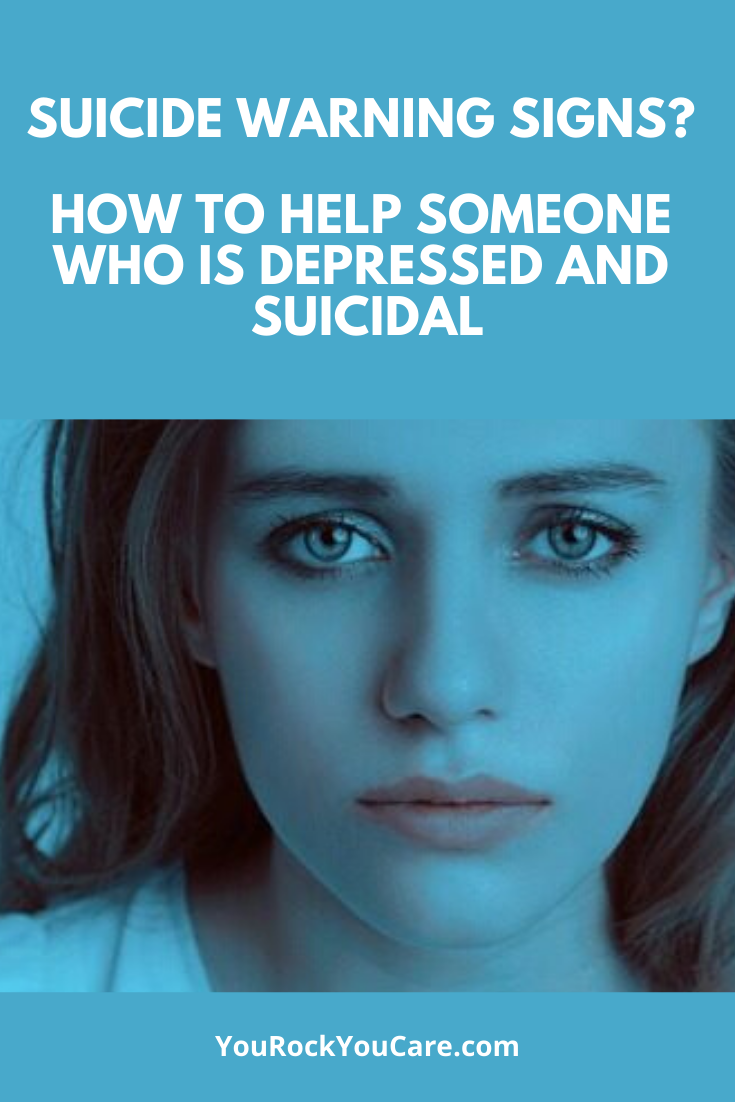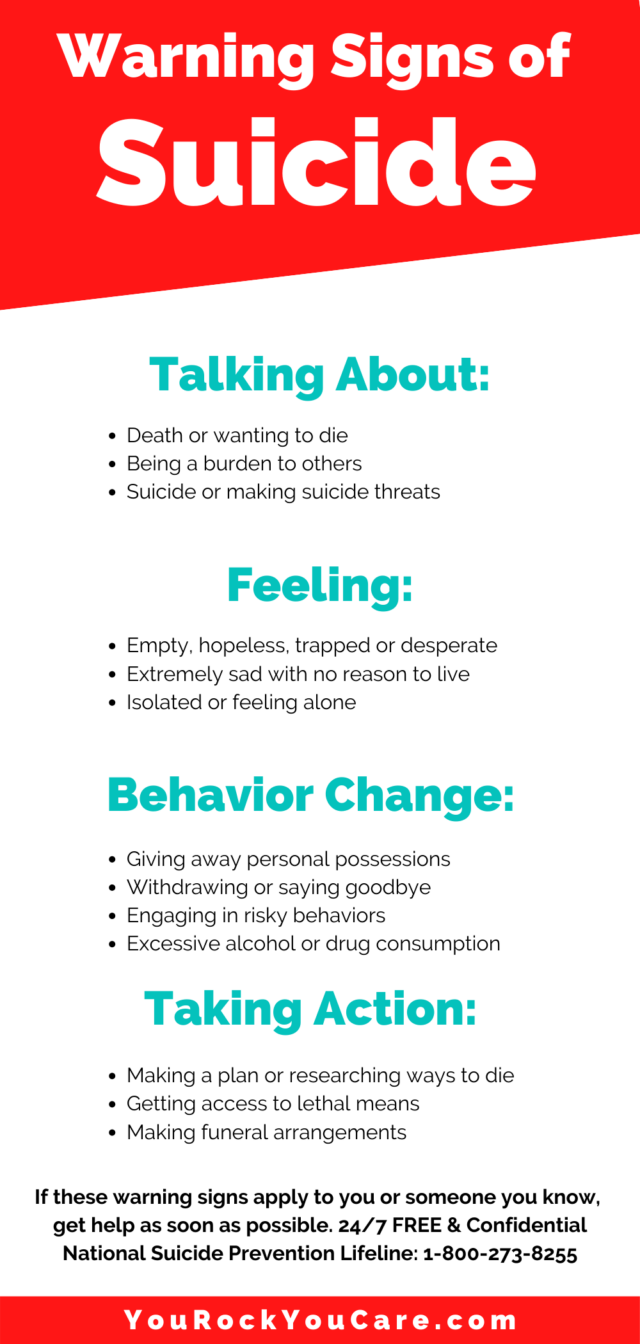Suicide warning signs are not always easy to see. Anyone could be struggling with depression as well as suicidal thoughts and behavior.
It’s extremely important to learn the warning signs of suicide and get help for anyone in crisis… before it’s too late.
If you or someone you know is struggling with depression or having suicidal thoughts, get help immediately. You can get FREE and confidential support 24/7…
In the United States, you can call the National Suicide Prevention Lifeline: 1-800-273-8255.
Alternatively, you can google “suicide prevention” to get the phone number for getting help and support in your country.

Risk of depression and suicide can increase due to financial problems, relationship problems, physical disability, illness, mental health issues, substance abuse, bullying, death or suicide of a family member or friend.
There are various resources available to anyone thinking about suicide and to those trying to prevent someone from harming themselves.
The National Suicide Prevention Lifeline provides free and confidential resources for people at risk for suicide, including a crisis hotline as well as resources for youth, veterans, disaster survivors, Native Americans, LBTQ+, loss survivors, attempt survivors and people who are deaf or hard of hearing. There are also resources in Spanish: Ayuda En Espanol.
Depression and Suicide: What Most People Don’t Know… But Should
According to the World Health Organization (WHO), depression is a common illness worldwide affecting more than 264 million people. Every year, nearly 800,000 people worldwide die due to suicide.
Major depression is one of the most common mental disorders in the United States.
According to the National Institute of Mental Health (2017), major depression affects 17.3 million Americans or about 7.1% of the U.S. population over age 18. Women are 70% more likely than men to experience depression in their lifetime.
A survey of adult caregivers caring for an elderly or disabled family member, friend or relative revealed that 40-70% of them have symptoms of clinical depression (Family Caregiver Alliance, 2011).
Depression is a common but serious illness. Major depression can interfere with or limit one’s ability to carry out major life activities.
Depression and Suicide In the United States
- Over 2/3 of the 30,000 reported suicides in the U.S. every year is caused by depression (White House Conference on Mental Health, 1999).
- There are three suicides for every two homicides committed in the U.S. Up to 2/3 of older adult suicides are attributed to untreated or misdiagnosed depression. (American Society on Aging, 1998).
- Suicide is the second leading cause of death among 10-34 year old individuals. It is the fourth leading cause of death among 35-54 individuals. (Centers for Disease Control and Prevention, National Center for Injury Prevention and Control, 2018).
Risk of depression and suicide can increase due to financial problems, relationship problems, physical disability, illness, mental health issues, substance abuse, bullying, death or suicide of a family member or friend.
Distorted Thinking Can Keep Depressed Individuals From Getting the Necessary Help to Prevent Suicide
Depression is like the mental equivalent of having diabetes. But instead of having problems with insulin, depressed individuals have problems with their brain chemicals (neurotransmitters).
Due to problems with their brain chemicals, people struggling with depression are not thinking clearly. They usually have cognitive distortions that cause them to believe their inaccurate thoughts.
Distortions in their thinking can make them believe that their world is terrible and their life is terrible. They feel empty, hopeless, trapped or desperate. They feel extremely sad with no reason to go on living.
Distortions in their thinking can make them believe that suicide is the only option to end their suffering.
Distorted thinking can keep depressed and suicidal individuals from getting the help that they need. Instead, they need a family member or friend to get them professional help to keep them safe until the crisis passes.
Severely depressed and suicidal individuals can not function. They’re emotionally and mentally impaired. If they’re considered to be a danger to themselves and others, they need to be treated in a psychiatric hospital.
If someone you know is struggling with depression, (s)he is potentially at risk for suicide.
It’s extremely important to learn the warning signs of suicide and get help for anyone in crisis… before it’s too late.

Due to problems with their brain chemicals (neurotransmitters), people struggling with depression are not thinking clearly. Distortions in their thinking can make them believe that suicide is the only option to end their suffering. Distorted thinking can keep depressed and suicidal individuals from getting the help that they need. Instead, they need a family member or friend to get them professional help to keep them safe until the crisis passes.
Suicide Warning Signs? How to Help Someone Depressed and Suicidal
* Ask if (s)he’s having thoughts of killing himself/herself. Asking the individual is one of the ways to find out if they need help and support. (S)he may not be truthful or may not be thinking clearly; so, it’s important to be aware of the warning signs of impending suicide (shown above).
* If (s)he is having suicidal thoughts, you need to get professional help for him/her. Remember, (s)he may not be thinking clearly and may not get the help needed. Call their psychiatrist and setup an appointment for him/her as soon as possible. If (s)he’s not currently getting mental health treatment, get advice and a referral from their physician for psychiatric help.
* If you feel that (s)he’s in imminent danger, get help and call 911 (or the emergency number for your country). (S)he needs to be protected until the psychiatric emergency passes.
* If you’re not able to contact someone who may be suicidal… if (s)he won’t open the door… or if (s)he won’t go to the hospital with you, you can call the police to do a “welfare check.” Some law enforcement officers are specially trained to do a suicide assessment when they do a welfare check.
What you do to help someone struggling with depression and showing suicide warning signs can make the difference between life and death.
